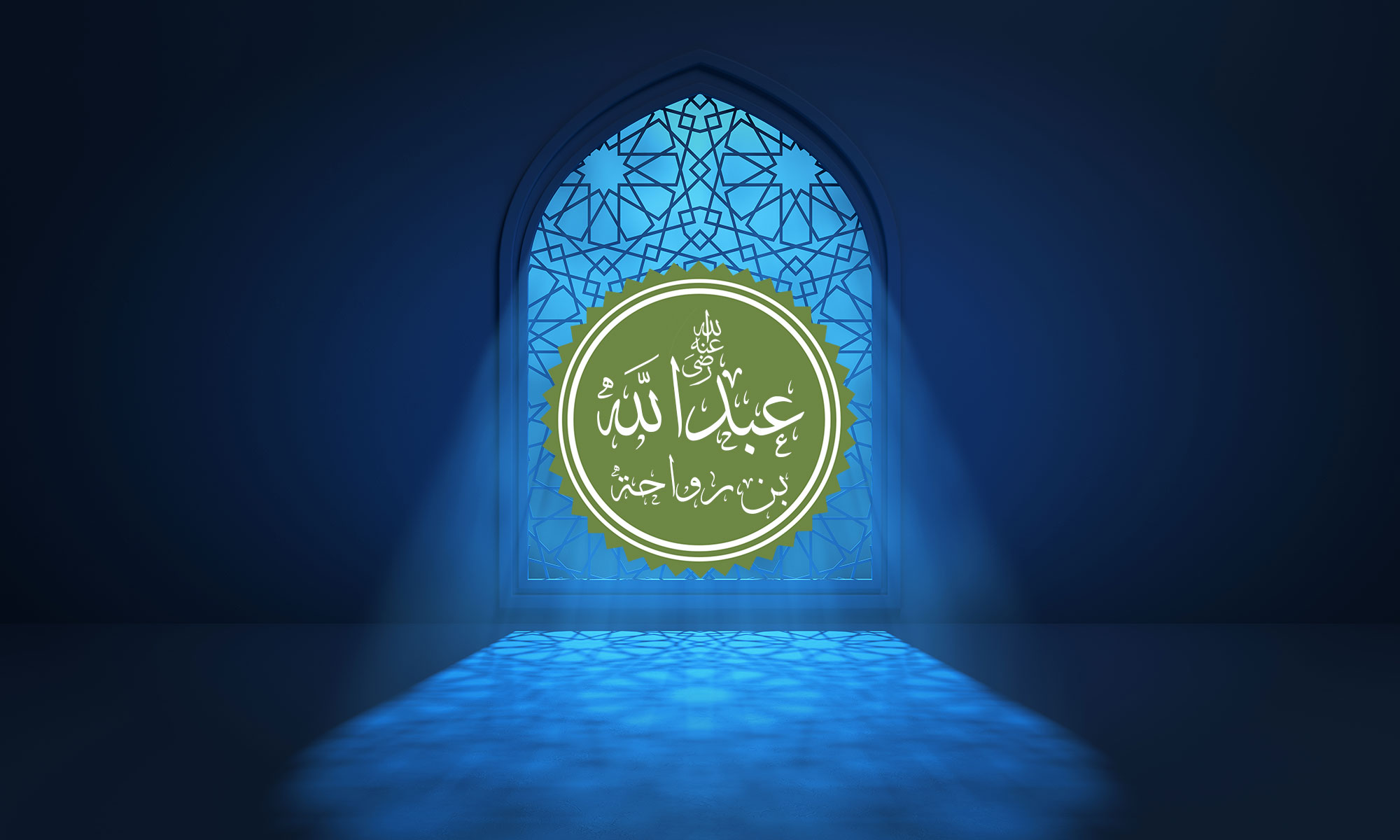The Companion Abd Allah ibn Rawahah

Who is Abd Allah ibn Rawahah?
The noble companion Abd Allah ibn Rawahah ibn Tha‘labah ibn Imri’ al-Qais ibn ‘Amr ibn Imri’ al-Qais ibn Malik al-Aghar ibn Tha‘labah ibn Ka‘b ibn al-Khazraj ibn al-Harith ibn al-Khazraj al-Ansari al-Khazraji, the famous poet.
He was known by the kunya (nickname) Abu Muhammad, and some said his kunya was Abu Rawahah, and some said Abu ‘Amr. His mother was Kabshah bint Waqid ibn ‘Amr ibn al-Iṭnabah, also from the Khazraj tribe.
Some of Abd Allah ibn Rawahah's Virtues
He was one of the Nuqaba’ (chiefs) on the Night of Aqabah, and he witnessed the battle of Badr and what followed until he was martyred at the battle of Mu’tah. He was among the scribes of the Prophet (peace be upon him).
He was the one who brought the news of the victory at Badr to Medina, and the Prophet (peace be upon him) sent him with thirty horsemen to Usayr ibn Rizam, a Jewish leader in Khaybar, and he killed him. After the conquest of Khaybar, he was sent again to estimate its production.
Among his virtues, it is reported in the hadith of Abu Hurayrah that the Prophet (peace be upon him) said:
"What an excellent man Abd Allah ibn Rawahah is!"
Abd al-Rahman ibn Abi Layla narrated:
A man married the widow of Abd Allah ibn Rawahah and asked her about his habits. She said: "Whenever he was about to leave his house, he prayed two rak‘ahs, and whenever he entered, he prayed two rak‘ahs. He never abandoned this habit”.
They said:
"Abd Allah was the first to set out for battle and the last to return”.
Abd Allah ibn Rawahah Martyrdom at the Battle of Mu’tah
Abd Allah (may Allah be pleased with him) was the third commander at the Battle of Mu’tah, following Zayd ibn Harithah and Ja‘far ibn Abi Talib.
When the people bid farewell to the commanders of the Prophet (peace be upon him), Abd Allah ibn Rawahah wept. They asked him why he was crying, and he said:
"By Allah, I am not crying out of love for this world or attachment to it, but I heard the Messenger of Allah (peace be upon him) recite:
‘There is not one of you but will pass over it (Hell); this is upon your Lord an inevitability decreed’". (Surah Maryam, Ayah 71).
The army moved toward Mu’tah (in 8 AH), where they found the Roman army numbering nearly 200,000 soldiers. When the Muslims saw their small numbers in comparison, they were overwhelmed, and some said:
"Let us send word to the Messenger of Allah and inform him of our enemy’s numbers. He may either reinforce us or command us to advance, and we will obey”.
But Ibn Rawahah rose among them and said:
"O people! By Allah, we do not fight our enemies with numbers, strength, or might. We fight them only with this religion with which Allah has honored us. So go forth, for it is only one of two good things—victory or martyrdom”.
The Muslims then shouted: "By Allah, Ibn Rawahah has spoken the truth!"
A fierce battle ensued. The first commander fell as a martyr, then the second commander fell as a martyr, and Abd Allah ibn Rawahah took up the banner as the third commander. In hesitation, he recited to himself:
"I have sworn, O soul, that you shall go forth!
Indeed, you shall go forth, willingly or unwillingly!
If the people sound the war cry and rally,
Why do I see you disliking Paradise?
You have long been safe and secure—
Are you anything but a drop in a worn-out vessel?"
He then charged into the Romans with great force until his body fell as a martyr, and his wish was fulfilled.
At that very moment, the Messenger of Allah (peace be upon him) was in Medina with his companions. He suddenly fell silent and raised his eyes, showing grief. Then he said:
"Zayd ibn Harithah took the banner and fought until he was martyred. Then Ja‘far took it and fought until he was martyred”.
He paused for a moment, and the faces of the Ansar changed, fearing that something unfavorable had happened to Abd Allah ibn Rawahah.
Then he continued:
"Then Abd Allah ibn Rawahah took the banner and fought until he was martyred”.
He then fell silent again before his eyes brightened with joy and peace, and he said:
"They have been raised to me in Paradise on thrones of gold. But I saw Abd Allah ibn Rawahah’s throne slightly tilted compared to his two companions. So I asked: ‘Why is this?’ I was told: ‘They both proceeded without hesitation, whereas Abd Allah hesitated slightly before proceeding, then he went forth and was martyred’".